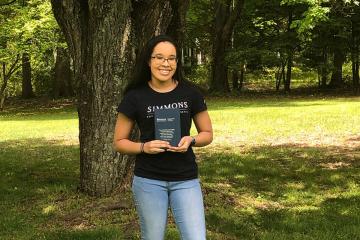Amanda Carey received her PhD in psychology from Northeastern University. Prior to coming to Simmons, she completed post-doctoral research at Tufts Human Nutrition Research Center on Aging in the Neuroscience and Aging Laboratory, where she studied the behavioral and neurochemical effects of aging and how nutritional intervention may allay some of the brain alterations associated with aging. She is continuing this line of research in her own laboratory at Simmons.
Professor Carey has over 25 publications in scientific journals and enjoys bringing her knowledge of the latest neuroscience research into the classroom. Professor Carey also believes that learning goes well beyond the time she spends with students in the classroom and that scholarship and academic achievement are not simply a result of course work and studying; a critical component of an undergraduate education is having a mentor. Mentorship played a valuable role in her own development as a scientist, and she aims to extend the same kind of one-on-one advising and hands-on training to the students at Simmons University.
In her free time, Professor Carey loves to Irish step dance and play video games.
Education
- PhD, Psychology-Behavioral Neuroscience, from Northeastern University
- MA, Psychology, from Northeastern University
- BS, Psychobiology, from Simmons College
Area of Expertise
- Nutritional Neuroscience
Courses
- PSYC 101 Introduction to Psychological Science
- PSYC 201 Biological Psychology
- PSYC 244 Drugs and Behavior
- PSYC 247 Sensation and Perception
- NB 347 Seminar in Neuroscience and Behavior
Research/Special Projects
Dr. Amanda Carey's research is in the field of basic neuroscience and the physiology of behavior. Her overall research goals are to determine the mechanisms by which aging and disease-related proteins result in neurodegeneration and behavioral alterations, and how adjunctive nutritional therapies and strategies can directly alter cellular functioning or prevent the damage associated with “normal” aging or disease states such as dementia. She is investigating the difference between how "good" fats (like those from walnuts) and "bad" fats (like those found in fried foods) can affect the brain.
Publications/Presentations
Carey AN, Fisher DR, Bielinski D, Cahoon DS, Shukitt-Hale B. Walnut associated fatty acids inhibit LPS-induced activation of BV-2 microglia. Inflammation, in press.
Carey AN, Pintea GI, Van Leuven S, Gildawie KR, Squiccimara L, Fine E, Rovnak A, Harrington M. (2019) Red raspberry (Rubus ideaus) supplementation mitigates the effects of a high-fat diet on brain and behavior in mice. Nutritional Neuroscience, July 20:1-11. [Epub ahead of print]
Shukitt-Hale B, Thangthaeng N, Miller MG, Poulose SM, Carey AN, Fisher DR. (2019) Blueberries improve neuroinflammation and cognition differentially depending on the individual cognitive baseline status. The Journals of Gerontology Series A Biological Sciences and Medical Sciences, 74(7):977-83.
Gildawie KR, Galli RL, Shukitt-Hale B. Carey AN. (2018) Protective effects of foods containing flavonoids on age-related cognitive decline. Current Nutrition Reports, 7(2):39-48.
Carey AN & Galli RL. (2017) Mitigating the effects of high fat diet on the brain and behavior with berry supplementation. Food & Function, 11:3869-78.
Carey AN, Gildawie KR, Rovnak A, Thangthaeng N, Fisher DR, Shukitt-Hale B. (2017) Blueberry supplementation attenuates microglia activation and increases neuroplasticity in mice consuming a high fat diet. Nutritional Neuroscience, Sep 21:1-11.
Carey AN, Miller MG, Fisher DR, Bielinski DF, Gilman CK, Poulose SM, Shukitt-Hale B. (2017) Dietary supplementation with the polyphenol-rich açaí pulps (Euterpe oleracea Mart. and Euterpe precatoria Mart.) improves cognition in aged rats and attenuates inflammatory signaling in BV-2 microglial cells. Nutritional Neuroscience, 20:238-45.
Poulose SM, Bielinski DF, Carey A, Schauss AG, Shukitt-Hale B. (2017) Modulation of oxidative stress, inflammation, autophagy and expression of Nrf2 in hippocampus and frontal cortex of rats fed with açaí-enriched diets. Nutritional Neuroscience, 20:305-15.
Galli RL, Carey AN, Luskin KA, Bielinski DF, Shukitt-Hale B. (2016) Red raspberries can improve motor function in aged rats. Journal of Berry Research, 6:97-103.
Carey AN, Liu X, Mintzopoulos D, Paris JJ, McLaughlin JP, Kaufman MJ. (2015) Conditional Tat protein brain expression in the GT-tg bigenic mouse induces cerebral fractional anisotropy abnormalities. Current HIV Research, 13:3-9.
Paris JJ, Singh HD, Carey AN, McLaughlin JP. (2015) Exposure to HIV-1 Tat in brain impairs sensorimotor gating and activates microglia in limbic and extralimbic brain regions of male mice. Behavioural Brain Research, 291:209-18.
Shukitt-Hale B, Bielinski DF, Lau FC, Willis LM, Carey AN, Joseph JA. (2015) The beneficial effects of berries on cognition, motor behaviour and neuronal function in ageing. British Journal of Nutrition, 114:1542-9.
Carey AN, Gomes SM, Shukitt-Hale B. (2014) Blueberry supplementation improves memory in middle-aged mice fed a high-fat diet. Journal of Agricultural and Food Chemistry, 62:3972-8.
Rowan S, Weikel K, Chang ML, Nagel BA, Thinschmidt JS, Carey A, Grant MB, Fliesler SJ, Smith D, Taylor A. (2014) Cfh genotype interacts with dietary glycemic index to modulate age-related macular degeneration-like features in mice. Investigative Ophthalmology and Visual Science, 55:492-501.



